“We leave something of ourselves behind when we leave a place, we stay there, even though we go away. And there are things in us that we can find again only by going back there.” ― Pascal Mercier, Night Train to Lisbon

The Golden Years
He was a big man with a big heart. Yet while we spent many hours working with him, and he told many stories, you didn’t learn a lot about his early life.
Eric Raselli lived in Melbourne’s inner eastern suburbs … a nice white weatherboard house with steep pitched roof, English type trees at the front.
He loved to get away to the country. Get in the car early in the day and head north … from Bendigo in Central Victoria to the Mallee … the wheat and sheep areas of Birchip, Sea Lake, Beulah, Manangatang. The gold fields of Dunolly, Moliagul and Tarnagulla.
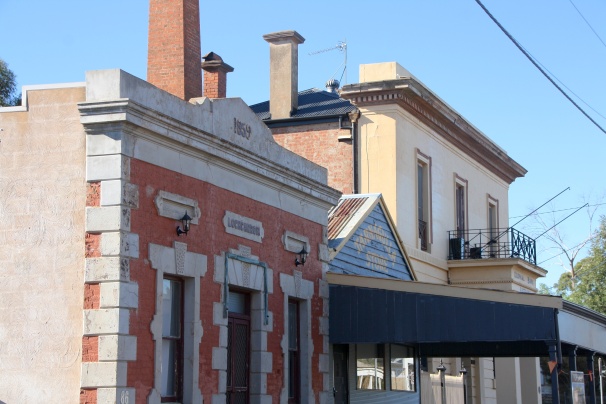
Tarnagulla: Memories of a golden past. Photo: leavearly@icloud.com
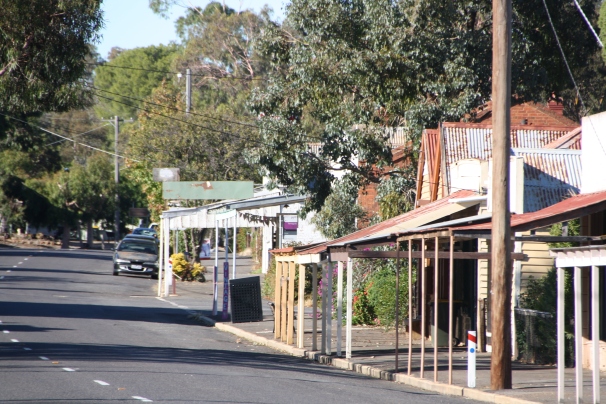
He used to insist on stopping at each level crossing. It must have been a reminder of his army days.
Some of these railway lines would only see a train a couple of times a year – when the wheat harvest was on.
Yet you could see his point. Always expect the unexpected.
This was in the 1960s and each week we would be travelling throughout Victoria.
There was a team of auditors and clerks, and our role was to check on business integrity as well as development of the branches of the bank.
I think to a man, the bosses were all former servicemen in the various forces – Army, Navy and Air Force – during World War II or the Korean War.
Each had a story to tell, and their different work ethics. Razza, Black Jack, Dasher, The Colonel.


Now, half a lifetime later, some of us would talk about doing a road trip through some of the country towns that held such great memories.
Do it while we still can. Relive those roaring days … retell the tales of times lived with good friends?
That chance came unexpectedly with the chance of tacking a couple of extra days onto a journey to Sydney to see my daughter.

A golden morning in Bendigo. Photo: leavearly@icloud.com

Twenty four hours later I was in the former gold mining city of Bendigo and heading west, towards the Mallee.
The memories came flooding back as the road rolled out before me.

The temperature would often be hovering around 40 degrees celsius … 100 in the fahrenheit measurement. And after a day poring over the ledgers at the bank, we would head to the pub.
These were roaring days when the property owners and the workers would make their way into town in their trucks, utilities and sedans for a few cold beers … and a yarn.

The main street of Manangatang. Photo: leavearly@icloud.com
Razza would make sure the chemist was agreeable to cooking up his famous birds nest soup at home after we had enjoyed a few drinks.
And we would sit in the kitchen til late at night talking about the economy and philosophising on life’s questions.
These, after all, were men who had seen a lot of what the world could dish up … from the Great Depression to World War II.

Grain silos at Chinkapook. Photo: leavearly@icloud.com
There was one night when we were driving back to the motel … maybe the chemist actually lived in nearby Chinkapook. I cannot think of why would be driving through the streets of this small town at midnight for any other reason.
It was the town a family of seven boys and a girl had come from, and they fitted right into our football, netball and cricket teams in West Gippsland.
A place where the football grounds were more than likely wet and muddy on game day rather then the dry, red sand of Chinky.
Seeing how I had told him about the family, this night Razza decided to show me the town.
A couple of grain silos beside the railway line, a scattering of houses, and a community hall with a set of tennis courts beside it.The main street was tar sealed but when we went around the block the back streets were all sand … and we nearly ran over this bloke, asleep on a stretcher in the middle of the street.
I guess it was cooler out there than in his house.
But Razza also told me about Dunolly. And that town sticks in my memory.
The history. The landscape. The character.

The town was built on a gold strike in the mid 1800s but it also had one of the biggest wheat silos around.
Razza had family at nearby Moliagul. So he knew the country well.
During the gold rush era of the 1850s and ’60s, Dunolly and the surrounding district turned up more gold nuggets than any other region in Australia and became known as the Golden Triangle.

The Welcome Stranger site at Moliagul. Photo: leavearly@icloud.com

The 64.5-kilogram Welcome Stranger, the world’s largest nugget of gold, was discovered at Moliagul in 1869.
It was cut at Dunolly due to its size … and a replica was kept in the bank at Wedderburn. Apparently there is a replica in the Goldfields Historical and Arts Museum.
The huge grain storage shed was built in the town in 1941 and expanded a couple of years later to reputedly make it the largest shed in the world.
Yet the most enduring legacy of the area was The Reverend John Flynn, who founded the legendary Flying Doctor Service, was born at Moliagul in 1880.
So with this background we found ourselves pushing through the doors of the Railway Hotel in Dunolly on a chilly winter’s day in the late 1960s.

The Railway Hotel at Dunolly. Photo: leavearly@icloud.com
Yet then again, as is often the way, the stoney make-up of the country where gold is found also lends itself to wine growing.
The earliest plantings were in the 1850s and there are still good wines being produced here today.
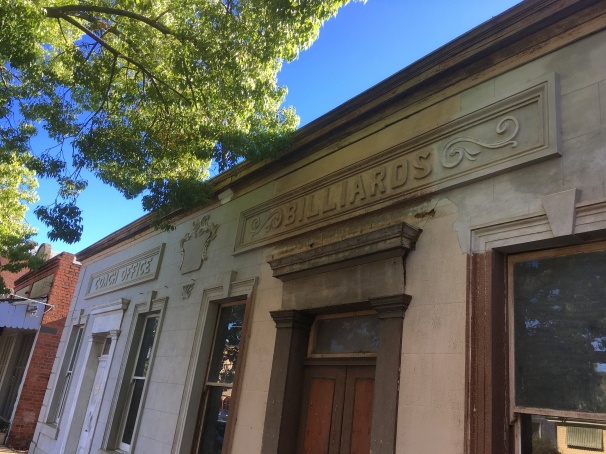
This day in the middle of winter, it was grey and cold. I was sure there would be a frost in the morning.
But as soon as we stepped into the saloon bar of the pub one could immediately feel the warmth, not just of the open fire but those inside the room.
Crowded, friendly. And the fire was stacked with mallee roots … glowing red. One of the best woods you could get. Clean burning and throwing out plenty of heat.
They are the stump and roots of the mallee gum, a stunted eucalyptus that manages to thrive in these tough conditions.
The beers were good and so was the fellowship.
After half a dozen seven ounce glasses I went out to the car to get some papers.
The impact of stepping out into the cold air was immediate. It hit me like a goods train.
Yet as well as the cold, I put it down to the roaring fire having dragged all the oxygen out of the air.

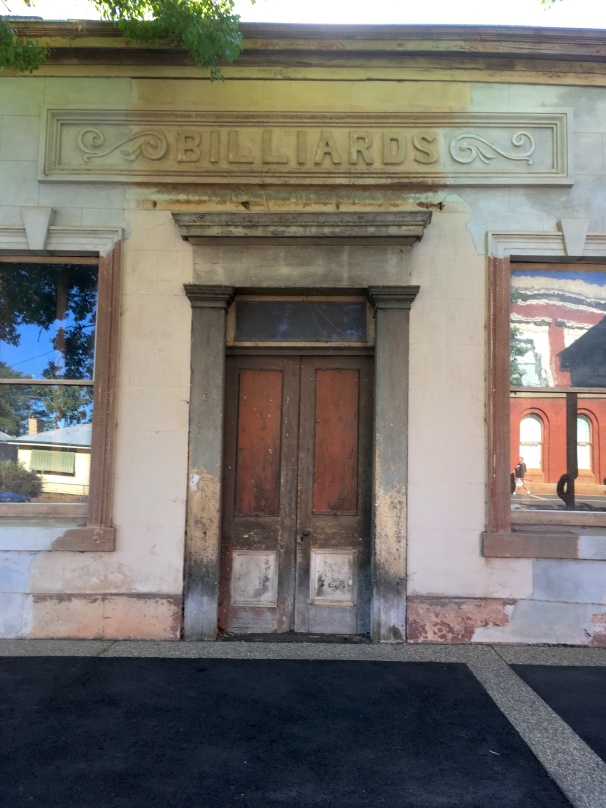
Standing there in the street I reflected on the stories Razza had told me about the men from Dunolly who went off to war.
Everywhere you go in Australia you will find small towns with their monuments.
Some towns are gone.
All that remains is cenotaph weathered by time, honour rolls stored somewhere safe. In a hall, a church, a Sunday school hall.
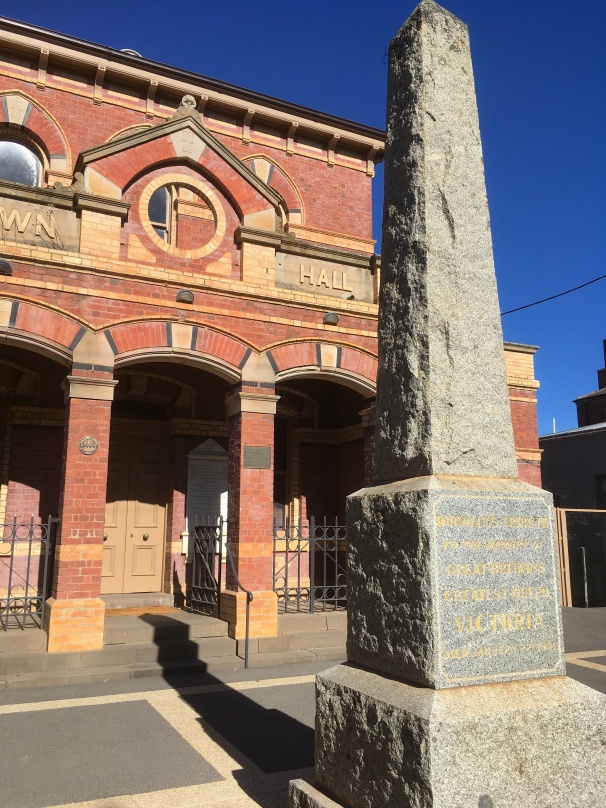
The names on the honour roll in Dunolly told of men serving in the Boer War in Africa in the late 1800s, The Great War of 1914-18 and World War Two in Europe and the Pacific.
How many men went away from home, never to return?
In recent times their story has been hauntingly told in the song by Michael Whittle, The Last Man From Dunolly.
It reminds you there is no glory in war, only heartbreak.
“I’m the last man from Dunolly,
of our battalion at Fromelles.
General Haking gave the orders,
and the troops were shot to hell.’’
It’s a song that can bring tears to the eyes.
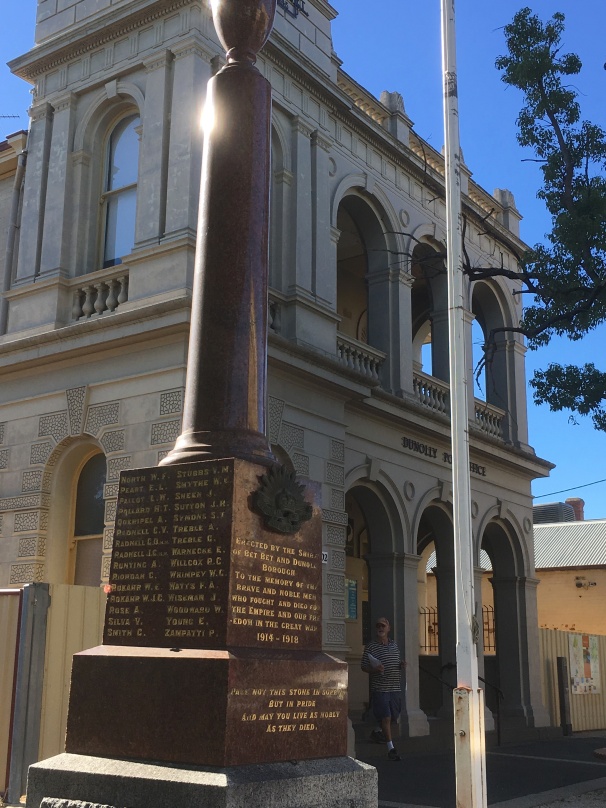
What started out as a trip down memory lane – a chance to kick over old traces and relive some extraordinary times – turned into a journey that in many ways closed a chapter in my life.
The country towns have been a stark reminder. Regional centres are growing at their expense.
General stores are boarded up. Newsagencies closed.
So many of the hotels are gone … and so have many of our mates.
While it is good to go down those roads again, it’s generally more rewarding to take a turn in the road and discover different landscapes, forests, plains and wildlife … meet new people. And make the time to stop and listen to their stories.

Sunset on the wheat fields at Sea Lake. Photo: leavearly@icloud.com






























May there be many more new landscapes, forests, plains and wildlife…and people’s stories for you to welcome into your life. Wishing you well.
LikeLiked by 1 person
Thanks so much for your wishes across the miles … we all need that feeling of being connected. This was the result of a series of thoughts swirling around in my mind and the opportunity eventually came to retrace those steps. The timing of writing it was brought on by the way the Earth is being placed under threat. It’s time for world leaders to connect the dots … drought, bushfires, pollution, pandemics. Let’s take the opportunity to learn from this. Work together. Your writing and travels through the years have really inspired me to look within as well as seeing everything around us in a clearer light.
LikeLiked by 1 person
What a beautiful trip down memory lane. It is drenched with nostalgia. I always find it sad that small towns crumble away. The quote you used is so appropriate. I love to take roadtrips through small towns when I go back to South Africa on visits. I wonder what the world will look like at the end of this pandemic and what lessons we will have learned. Stay well.
LikeLiked by 1 person
Thank you so much Jolandi, and I trust this next chapter in your lives will be filled with adventure, excitement at little successes and enjoyment. In a word: Satisfaction. Every day will be one of discovery and growth … in all ways. Learning, wisdom and the delights of harvesting what you grow and produce. You should see if you can watch that movie: Night Train To Lisbon. I was there in 1970, when soldiers were going off to Mozambique. There was resentment, with troops going to a distant country to fight an unknown war. I did not sense what was about to happen in Portuguese politics. But the movie, and the book for that matter, tells a much wider story … as shown by the quote.
My journey down those backroads was one I had to make … while it put paid to an era it only helped to embed those memories of mates and colleagues in my head – and my heart.
One can only hope that people will realise the health crisis is a warning that the world needs to renourish itself. Going back to the same old ways is not the answer. This is the chance to be brave and be innovative, create a lifestyle that is truly sustainable. Go well.
Your journey reminds me of one I went on many years ago … timber house on a small acreage, solar, house cow, home-made butter and cheesecakes, fresh eggs and just enough fruit and vegetables for our table plus the visiting kangaroos and possums … :))
LikeLiked by 1 person
I agree with you that going back to the old ways is definitely not the answer. I really am looking forward to our next chapter, one that is sadly being delayed by the pandemic, but we trust that all will work out for the best. I didn’t realise you had a taste of the simple life. And a cow! Michael wants sheep and even mentioned a cow, but I’m not sure I want any livestock. I’ll settle for chickens for eggs though, but that’s about it. I guess time will tell as to who will win this battle.
I’ve heard of the book before, but didn’t realise there is a movie too. Will definitely check it out. Thank you. I’m also looking forward to learn about Portuguese history.
LikeLiked by 1 person
Ahh, yes … the house cow. Daisy. She was a jersey and beautiful nature, wonderful milker. We shared her with a neighbour. Simply too much milk for one household!! But they can be a tie … needing to be milked, cared for each day.
I had escaped the cities and looked for the good life … but the corporate world caught up with both myself and neighbour, even though we are in a beautiful regional area. That’s a part of life … so many others have woken up to the secret too .. haha .. yet this lockdown of movement has meant we can have our beaches to ourselves again … even for just a short while :))
I remember running on the southern beaches of Portugal in winter, salt air on my face, wind in my hair … almond blossom on the trees along the roadsides .. and just thinking. I’m free.
LikeLike